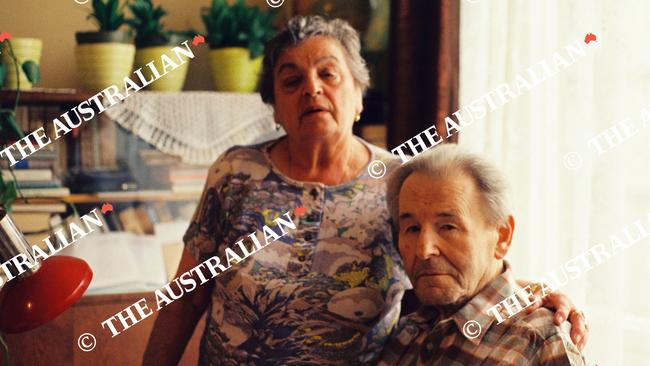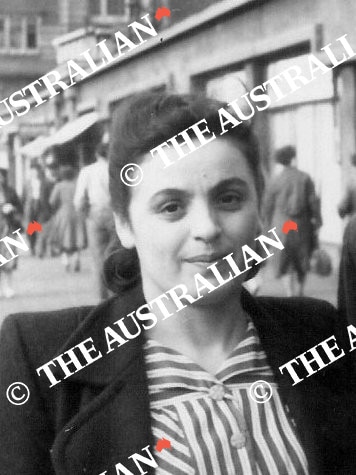Bestselling author accused of betraying Holocaust survivor
One of Australia’s bestselling authors has been accused of exposing a closely guarded secret.

A bestselling author has been accused of breaching the privacy of a late Holocaust survivor who had fought to keep her personal history secret.
Melbourne-based Heather Morris has become one of the country’s most successful debut writers, with her first book, The Tattooist of Auschwitz, selling more than three million copies internationally in just 18 months. Her new book, Cilka’s Journey, is being published on October 1.
According to data provided to The Weekend Australian by Nielsen Book, The Tattooist of Auschwitz, based on the wartime experiences of Melbourne man Lali Sokolov, is the fastest Australian fiction debut title to have sold 200,000 print copies since Australian BookScan records began in December 2002. That record was achieved in 75 weeks — 10 weeks faster than the previous record holder, Nikki Gemmell’s The Bride Stripped Bare, which was originally published anonymously.
MAGAZINE FEATURE: Blurred lines and backlash
In just over a year and a half, The Tattooist of Auschwitz has become one of the all-time top 30 adult fiction books on record. It has also proved to be contentious.
Alarmed that details in the book might be distorting history, in November the administrators of the Auschwitz concentration camp released an extensive fact-finding report, outlining a series of historical inaccuracies in Morris’s book. They were concerned that increasing numbers of visitors to the camp believed it was true when in fact it was “almost without any value as a document”.
Now Morris’s new book, a sequel, is also courting controversy. Cilka’s Journey is based on the experiences of the late Slovakian Holocaust survivor Cecilia (Cilka) Klein, who had featured in The Tattooist of Auschwitz.
She was accused by the Russians after World War II of sleeping with the enemy during her time imprisoned at the concentration camp and sent to a gulag for a decade.
Cilka’s Journey is marketed as a novel that, according to its blurb, is “based on what is known of Cilka Klein’s time in Auschwitz, and on the experience of women in Siberian prison camps”. It depicts the teenager as a sex slave who was later accused of “prostituting (herself) to the enemy”. Slovakian writer Peter Juscak, the only person known to have interviewed Klein about her wartime experiences, says she resolutely denied such allegations. “I caught her words in a tape recorder,” Juscak told The Weekend Australian. “She says she was charged with ‘sexual services for the Germans’. She decisively (refuted) this. Nevertheless, she was condemned and deported to a camp in the north of Russia.”
On her return to Czechoslovakia in the 1950s, Klein met her husband, Ivan Kovac, who had also spent time in a gulag where he had been a contemporary of Nobel laureate Aleksandr Solzhenitsyn. She told Juscak that she and Kovac had agreed not to talk about their wartime experiences, and she had “insisted on keeping her secret about the Auschwitz and (gulag) drama until her death”.

“Cilka tried all her life to keep her personal history secret because she didn’t choose her tragic story voluntarily,” said Juscak, adding: “People who survived hell have the right to their secrets.”
As with The Tattooist of Auschwitz, Morris maintains that her novel is based on Klein’s life but is not a definitive account of the Holocaust. Juscak is uneasy that Klein, who died in 2004, is being used as the basis of the book’s main character, down to her name, place and date of birth and her arrival at Auschwitz. “To give real names and to talk about the story as real brings big risks.”
Morris has enjoyed massive success over the past year. The Tattooist of Auschwitz has been published in more than 50 countries and sat in top place on the New York Times bestseller list for weeks.
Yet concern about the accuracy of aspects of the book has also spread to Australia. At Melbourne’s Jewish Holocaust Centre, visitors whose Holocaust knowledge is derived from The Tattooist of Auschwitz are now specifically directed to relevant pieces of information at the museum. They include the fact that Lali Sokolov’s position as a tattooist was rare and privileged, and the importance of luck in the stories of survivors.
“If you are going to fictionalise or adapt a true story … I think it is important to ensure that it is built on a foundation of reality,” says the centre’s director of education, Lisa Phillips.



